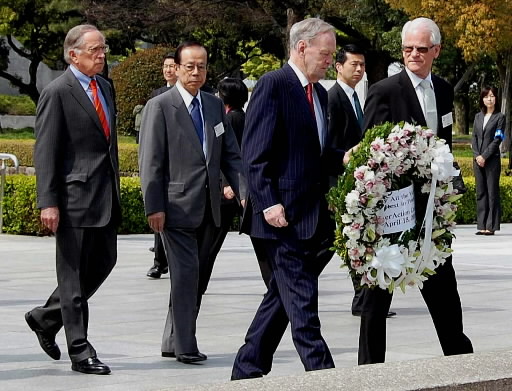Nuclear Weapons Can Be Eliminated: Chapter 12, Part 3
Jun. 20, 2010
Chapter 12: Opening the Door to Abolition
Part 3: Surest path to eliminating the nuclear threat
by the "Nuclear Weapons Can Be Eliminated" Reporting Team
Concern over nuclear terrorism
"As long as anyone has nuclear weapons, others will seek them. Nuclear materials and technology are increasingly widespread and accessible."
This is a quote from The Hiroshima Declaration adopted at the 28th Annual Plenary Meeting of the InterAction Council ("OB Summit") held in mid-April in Hiroshima. The former state leaders in attendance voiced a strong sense of crisis with the threat of the use of nuclear weapons at a level higher than ever before, contending that the abolition of these arms is the only way to eliminate this threat.
The Cold War, which pitted the nuclear arsenals of the United States and the former Soviet Union against one another, has ended. However, worries over nuclear terrorism, in which nuclear weapons and materials under loose control could be stolen and used, is considered to be a rapidly growing concern in the 21st century.
Furthermore, nations such as North Korea, which announced its withdrawal from the Nuclear Non-proliferation Treaty (NPT) to pursue nuclear capability, have appeared on the scene. Behind the nuclear development in Pakistan was a black market of secret trading involving nuclear equipment and technology.
The international community, however, is not prepared for this crisis.
Negotiations on the Fissile Material Cutoff Treaty (FMCT), which prohibits the provision of fissile materials, have not begun at the Conference on Disarmament in Geneva. No progress has been made on this treaty for the past ten years. In addition, with the United States unwilling to ratify the Comprehensive Test Ban Treaty (CTBT), this pact has not taken effect.
Meanwhile, nuclear power plants are being built around the world. With more nations independently enriching uranium and reprocessing spent fuel, including plutonium, under the NPT's guarantee of the right to use nuclear energy for peaceful purposes, this only heightens the concern that unsecured nuclear technology or materials may fall into the wrong hands or be diverted to military use.
Nuclear arms are considered weapons that must never be used due to their tremendous destructive power and their inhumanity. Some nations see this reasoning as a justification for going nuclear, arguing that possessing nuclear arms for protection is acceptable since the weapons will not be used. However, it cannot be said that such weapons will never be used unless the possibility that they may fall into the wrong hands is eliminated entirely.
Limits on nuclear security
As long as the prerogative of possessing nuclear weapons remains, nations will feel antagonism toward the nuclear powers and more countries will be drawn toward obtaining nuclear capability. The result will be proliferating warheads likely to become the object of terrorist desires. Thus, eliminating nuclear weapons from the earth is finally the surest and most efficient way of preventing all aspects of nuclear proliferation.
At the 2010 NPT Review Conference held this past May, a proposal to convene an international conference in order to create a road map for the abolition of nuclear weapons was raised, but this provision was not included in the final document adopted at the conference. Mayors for Peace has called for nuclear abolition by 2020 and Global Zero, an international initiative launched by world leaders from various fields has proposed abolition by 2030. At the recent review conference, the Non-Aligned Movement nations, including Egypt and Cuba, contended that abolition should be achieved by 2025.
The NPT signatories could not reach agreement on a target year for nuclear abolition at the review conference because of resistance from nuclear weapon states. Shouldn't the nuclear powers face up to the reality that strengthening the security of nuclear weapons and materials is simply a stopgap measure and not a fundamental solution to preventing wider proliferation?
(Originally published on June 16, 2010)
To comment on this article, please click the link below. Comments will be moderated and posted in a timely fashion. Comments may also appear in the Chugoku Shimbun newspaper.








